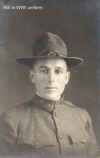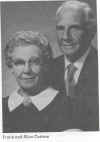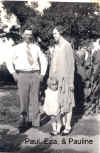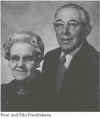

WILL AND NINA FREDRICKSON
Wilhelm Fredrickson was born
November 26, 1888 on a farm in the Gottland neighborhood north and east of
Concordia, Kansas. His parents were Charles and Christina Fredrickson both of
whom were recent Swedish immigrants. Wilhe1m, who later became known as Will, learned the Swedish 1anguage in this home and when he started to grade schoo1
needed to 1earn English. Even in o1d age, he cou1d quickly switch to Swedish in
his conversations. He first attended the Gottland Grade School and later the
District 8 school when his parents moved to the farm south of the Republican
River.
learned the Swedish 1anguage in this home and when he started to grade schoo1
needed to 1earn English. Even in o1d age, he cou1d quickly switch to Swedish in
his conversations. He first attended the Gottland Grade School and later the
District 8 school when his parents moved to the farm south of the Republican
River.
Will served in the 79th Balloon Company during World War I and was stationed at Brooks Field in San Antonio, Texas.
Nina Mary Roswell was born on June 15, 1896, the second daughter of Matthew and Florence Roswell. They lived on a farm in the Gottland neighborhood. She and her older sister attended the Gottland Grade school. Florence Roswell died while the girls were yet quite young, and they were reared essentially by their father.
Wilhe1m Fredrickson and Nina Mary Roswell were married at Concordia, Kansas. To this union were born three sons. Char1es Mathew was born December 2.3, 1921, William Keith was born September 25, 192.3, and Robert Eugene was born August 15, 1925. The boys all attended District 8 school and Concordia High School.
Charles quickly moved up the ladder and spent his time in mid management with severa1 Corporations. Char1es life ended in a tragic car accident. Keith, sensing a ca11 to serve the Lord, took his time in getting his bachelors and Master's degrees. He was ready after graduating in 1954. He served as a pastor for twenty years and then switched to Christian Counseling and is still doing this at the age of 79. Bob was a salesman and he was a good one. He died in 1986 of lung cancer, although he did not smoke.
Wil1 was tempermenta11y a ph1egmatic type person. He did a great dea1 of thinking but did not freely and openly share his thinking unless someone showed in interest, even then he wou1d be sparing with his words. He was more of a listener that a talker. These characteristics set him apart from his four younger brothers. They were articulate and gregarious men.
As a boy, Will aspired to express himself in music and even attempted to play a violin. It wou1d seem that his father strongly discouraged him having anything to do with music. But the desire for music did come out not in his performing abilities but in his deepening love for classica1 music as the years came and went. He and his wife Nina did attend some concerts of the Kansas City Philharmonic Orchestra when it came to Concordia during the 1930's.
When they moved to Denver in 1943 they often attended concerts of the Denver Symphony. Later in life, Will purchased high fidelity music equipment and turned their living room into a concert hall especially in the afternoons. He became conversant with composers and even conductors of major orchestras.
Will was a perfectionist in many ways. His corn rows were always perfectly straight; hence the job of planting corn was never given over to anyone else. It was also necessary to go through the cornfield during the growing season with hoes to cut out all cockle burrs, sunflowers, and other weeds. Willís fencerows were made up of perfectly straight rows of posts. And the barbed wire had to be stretched very tightly. Sagging was not tolerated.
In his earlier days, the house was white, so was the chicken house and garage. The barn was red with a five-point star. His orchard and grape arbor were his pride and joy. He worked hard to put together a farm living place that was something to be proud of.
Then in 1935 a disastrous flood swept through the Republican River valley and left his farm in a state of nearly total ruin. Parts of the Union Pacific and Burlington Railroad tracks, with the ties connected, swept over the orchard and grape arbor destroying them. Nearly all fences were destroyed and mud was everywhere. Water had gotten into every building including the house and after that flood the name of the game was survival. Life was never to be the same after that flood. When a buyer offered to buy the farm from Will, he had a deal.
Will loved working on mechanical things. Prior to his marriage he was offered a job working for an implement company in Concordia, but again his father dissuaded him. His liking for things mechanical showed up when he purchased a used Hart Parr tractor. He rebuilt everything that needed to be redone on that machine, and seemingly loved every moment of it. Later when Wi11 and his younger brother Carl purchased a used combine, they did the same thing to that combine. They rebuilt it from the bottom up.
Later when Will and Nina moved to Denver, the Union Pacific Railroad hired him where he enjoyed working on mechanical things for the rest of his working days.
In the spiritual realm, Will was a quiet man, but things were going on in that department also. Something happened in Concordia that left him wounded spiritua11y. What it was will always be a mystery. The move to Denver brought a spiritual reviving in him. He talked about making the move as a step of faith.
Early in the Denver experience he asked Keith to find a church for the family to attend. That church was Beth Eden Baptist Church whose pastor was Sam Bradford. Some time later, he announced to the family that we were a11 going to join Beth Eden that Sunday Morning. And that is what happened. Will was faithful to that pastor and his church.
 This
church and its pastor played a significant role in the lives of Will and Nina as
well as Bob and Keith. In the early 50' s there was some kind of upheaval in
that church which eventuated in the birth of a new church called Trinity Baptist
Church. Will and Nina were a part of this new church and were in that
congregation when a new thousand seat sanctuary was built in 1959. Wi11 was a
member of this church until his death in 1970. Nina continued to be in that
church until 1988, when she left Denver to live her last two years of life in
the Sunset Home in Concordia.
This
church and its pastor played a significant role in the lives of Will and Nina as
well as Bob and Keith. In the early 50' s there was some kind of upheaval in
that church which eventuated in the birth of a new church called Trinity Baptist
Church. Will and Nina were a part of this new church and were in that
congregation when a new thousand seat sanctuary was built in 1959. Wi11 was a
member of this church until his death in 1970. Nina continued to be in that
church until 1988, when she left Denver to live her last two years of life in
the Sunset Home in Concordia.
provided by Keith Fredrickson
Frank and Alice Carlson
Born January 23, 1893, near Concordia (Cloud County), Kansas; son of Charles Eric Carlson, a fanner, and Anna Johnson Carlson; educated at local schools, Concordia Normal and Business College, and short courses at Kansas State University (1910-12); military experience in World War I, private in army; married Alice Fredrickson on August 26, 1919, 1 daughter and 1 foster son; religious preference Baptist; died May 30, 1987, in Concordia, buried in Pleasant Hill Cemetery , Concordia.
Frank Carlson was well qualified by prior service in the state legislature and in Congress when he won the Republican primary for governor in 1946. Carlson spent the next two and one-half months campaigning in his low-key style through all Kansas counties. His Democratic opponent was former governor Harry Woodring, who made repeal of prohibition his major issue, while Carlson was silent on prohibition. Carlson defeated Woodring 309,064 votes to 254,283, with 14,347 votes going to the Socialist and Prohibition candidates. In 1948 Carlson was reelected over Democrat Randolph Carpenter, 433,396 votes to 307,485, with 19,526 votes collected by the Socialist and Prohibition candidates.
Following service in World War I, Carlson went back to his Cloud County farm. As a Republican, he served two terms in the state house of representatives, from 1929 to 1933, and as Landon's state campaign manager in his 1932 bid for governor, resulting in his appointment as chairman of the Republican state committee (1932-34). In 1934 Carlson won the first of six consecutive terms in Congress by defeating an incumbent congresswoman, Kathryn O'Laughlin McCarthy.
When Carlson became governor in 1947, World War II was over, but it was still uppermost in people' s minds. In his first inaugural address, he said, "It is too obvious that all over the nation a strange and inverted prosperity prevails. It is almost spurious in its economic effect, because it is born of destruction. We created, we produced and we labored to destroy. In the desperation of war we achieved a productive capacity of farm and factory once thought impossible. Can we now beat our terrible tanks into tilling tractors so that in peace the struggles for living and security may be lightened, and so that we shall know neither poverty nor war any more?"
During wartime the state treasury had accumulated a sizable balance, and Carlson' s initial proposal to the legislature was a comprehensive outline for action in many areas. The administration recommended a new highway program, broad developments in education at all levels, and state aid to returning veterans. Later a twenty-year highway building program, reorganization of social welfare programs, transformation of the state' s mental hospitals, and a broad plan for rural medical services were implemented.
Carlson would later count the state 's new enterprise in the
treatment of mental illness as his major contribution. Carlson also supported
but did not obtain a severance tax and a small loan act. The legislature
approved an amendment repealing prohibition which voters endorsed in the
election of 1948. For his second inaugural address on January 10, 1949, Carlson
indicated he shared with all Kansas, "a deep pride in the glories of the
past and in our rich and sturdy traditions. But I want you to know that there is
something new under the Kansas sun in the form of a truly inspiring spirit of
progress. I see it everywhere. Wherever the machinery of government is creaky or
rusty, there is a universal demand that it be overhauled and geared to a new
concept of service-a concept which envisions true service to our people for the
things they want and deserve."
new
concept of service-a concept which envisions true service to our people for the
things they want and deserve."
When Senator Clyde Reed died in l949 Carlson appointed a Kansas City businessman, Harry Darby, to take over Reed's seat. In 1950 Carlson campaigned for the United States Senate and won. After the election Darby resigned to enable Carlson to gain seniority in the Senate. So Carlson resigned as governor on November 28, 1950; Lieutenant Governor Frank Hagaman moved into the governor's office and appointed Carlson to the Senate for the remainder of Darby's term.
Throughout his political career Carlson was a humble and unassuming man. He had a saying: "There are no self -made men. It is your friends who make you what you are." Carlson was reelected to the Senate in 1956 and 1962 and then retired voluntarily in 1969. He was the only Kansas governor to serve in both houses of Congress; he had competed in thirteen primary election races and thirteen general election races without a loss. He also played a leading role in recruiting Dwight D. Eisenhower as a Republican candidate for president in 1952.
An active Baptist, Carlson was a cofounder of the annual President's Prayer Breakfast, later known as the National Prayer Breakfast. He received many honors from his native state, including designation as "favorite son " candidate in the 1968 Republican National Convention. In his hometown of Concordia, he was recognized by the Frank Carlson Library; in addition, there was a Frank Carlson Lecture Series at Kansas Wesleyan University, Salina, Ks., and the federal court building in Topeka is named for him.
Pgs.190-193, Kansas Governors, by Homer E. Socolofsky, 1990 University Press of Wichita
George and Dorothy Fredrickson
George was born November 13, 1896, in the Gotland community north of Concordia. His parents, Charles and Christine (Nelson) Fredrickson, were immigrants from Sweden. George had four sisters. Etta (Mrs. Anton Landin), Alice (Mrs. Frank Carlson), Marie (Mrs. Don Donahoo), and Beatrice (Mrs. Ward Butler). He had four brothers, William, Paul, Carl, and Lane. He served his country in World War 1 in the Medical Corps in France. Also, he attended Concordia Business College.
On May 4. 1921. George and Dorothy Louise Sjolander were married. Dorothy was born in Cambridge, Minnesota, July 25, 1902. Her parents were the Reverend Alfred and Adelia (Danielson) Sjolander. She had two brothers, Canon and Earl. There were three sisters, Lulu (Mrs. Charles Martinson), Vera (Mrs. Fred Nims), who taught in Concordia High School, and Maude (Mrs. Don Borthwick).
Dorothy's father Alfred died when she was ten years old. Her mother remarried later to Fred Carlson, and they were administrator of Sunset Home for years. They built their retirement home at 325 West Seventh in Concordia.
George was a farmer east of Concordia, but gradually assumed other areas of endeavor. He helped in the founding of the County Soil Conservation Service, the Farm Bureau legislative committee, the Production Credit Association, the Cloud County Co-op Elevator, and the Cloud County Museum. George served as Cloud County Commissioner and was in office when the new Court House was built.
He was associated with the Production Credit Association for thirty-five years, first as an inspector, and then a director, and served on board of directors of the Wichita Farm Credit Bank. As a member of the Baptist Church, he served in many capacities. He belonged to Kiwanis Club. He was a real estate broker in later years.
Dorothy was an excellent homemaker and mother. She was always
very active in her church (the Baptist Church) serving where ever needed. She
belonged to social clubs. 
George and Dorothy had three children: George A. of Concordia, Phyllis (Mrs. Robert Carlgren) of San Antonio, Texas, and Dell Christine (Mrs. John Warner) of Newark, Ohio.
George died May 15, 1971. Dorothy now (1992) resides at Sunset Home of Concordia.
Submitted by Dorothy Fredrickson
PAUL AND EDA FREDRICKSON
Paul Fredrickson was born April 22. 1899, and was a lifelong resident of the Concordia community. His parents, Charles and Christine Fredrickson, had immigrated to Cloud grew up on a farm east of Concordia, the present residence of George Fredrickson, Jr. Paul's brothers and sisters are Etta, William, Alice, George, Beatrice, Marie, Carl, and Lane.
Eda Ganstrom Fredrickson, also a lifelong resident of the Concordia community, was born to Herman and Christina Ganstrom on May 27. 1900. Her parents were also immigrants from Sweden, and Eda grew up on a farm in the Gotland community north of Concordia. Eda's sisters and brother are Althea, Mae, Stanley, and Della.
 Following their marriage on October 18, 1921, Paul and Eda lived
and farmed on the east side of Concordia for several years. They then moved to a
farm in Buffalo Township west of Concordia, adjacent to the farm of their
brother-in-law, Frank Carlson. Within a few years Frank's involvement in
politics became full time, so Paul assumed the responsibility of operating both
farms.
Following their marriage on October 18, 1921, Paul and Eda lived
and farmed on the east side of Concordia for several years. They then moved to a
farm in Buffalo Township west of Concordia, adjacent to the farm of their
brother-in-law, Frank Carlson. Within a few years Frank's involvement in
politics became full time, so Paul assumed the responsibility of operating both
farms.
In 1955 Paul and Eda built a new home at 906 Republican Street,
on a corner lot adjacent to the home of Paul's brother. George. At the time of
the move to town, Paul retired from active farming, and he formed the
Fredrickson Implement Co., an authorized Massey-Ferguson dealership.
brother. George. At the time of
the move to town, Paul retired from active farming, and he formed the
Fredrickson Implement Co., an authorized Massey-Ferguson dealership.
Paul and Eda were loyal and active members of the Baptist Church. They both had come from family backgrounds in the Swedish Baptist Church. When the use of the Swedish language was discontinued in 1923, plans went forward to merge with the First Baptist Church. For some years after the merger, Paul and Eda along with his brother, George, and his wife Dorothy, were called on as a quartet to sing hymns in Swedish, especially for funerals and other special occasions.
Paul served 45 years as the Secretary of the Board of Directors of Sunset Home of Concordia. He was an active member of the Concordia Kiwanis Club. He also served on School District II and Buffalo Township boards while they lived on the farm.
 They have one daughter, Pauline Hall, who now resides in Topeka,
Kansas.
They have one daughter, Pauline Hall, who now resides in Topeka,
Kansas.
Paul and Eda had been married 66 years at the time of Paul's death on November 22, 1987. Eda then became a resident of Sunset Home until her death on December 22, 1989.
Submitted by Pauline Hall